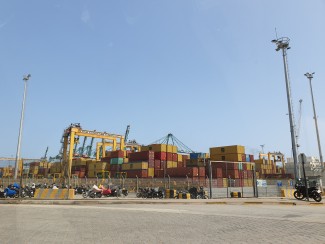In Mali, the Government's commitment to inclusive growth is recognized in the Growth and Poverty Reduction Strategy (2012-2017) and the Strategic Framework for Economic Recovery and Sustainable Development (2016-2018), which both give priority to the poorest people, especially women in rural areas.
The EIF programme has supported this pro-poor development approach by helping to strengthen the participation of women in the shea butter, gum arabic, mango and livestock value chains. These sectors were selected, because they involve a significant number of poor people, particularly small‑scale producers and rural women.
The Yanfolila region, located 240 km south of the capital Bamako, is home to 200,000 people (with over 50% women), many of whom are trapped in the vicious circle of poverty. The region has limited capacity to fully exploit its significant agricultural potential, in part because of the complications associated with the uptake of gold mining in the region. Women in Yanfolila, who have traditionally had limited educational and entrepreneurship opportunities, have been organized into Cooperatives, which have provided training on fruit production and quality and food hygiene standards. The Cooperatives have also adopted a community approach and have invested in fruit processing.
Through the EIF, 465 women in Yanfolila have been able to earn higher wages through mango farming and jam-making. The EIF has also assisted them in improving mango quality through phytosanitary treatments of mango orchards; popularized good agricultural practices; guided a dozen exporters to receive the GLOBAL CAP certification; and provided marketing support at national and international trade events.
Togeter with Development Partners, the Government of Mali through the EIF framework has established a fruit processing unit for the production of mango jam to support the Djiguiya Women Cooperative of Yanfolila, which has approximately 100 members. The Yanfolila fruit processing unit (ULTRAFRUY) seeks to empower these women by adding value to local fruits. Presently, the unit can produce up to 120,000 jars of 220 grammes annually. Now each of the 20 women in the processing unit earns a monthly salary of 150,000 FCFA (approximately US$255).
To maximize gains and grow women's income, ULTRAFRUY is planning to produce different jams (mango, orange, papaya, etc.) according to the fruit season. Through the EIF programme, the women representatives of ULTRAFRUY have also been assisted to participate in the Milan World Export Fair and the Dakar International Fair. As a result, promotional sales of mango jams totalled approximately US$3,778 (4,460 pots).
With EIF support, ULTRAFRUY also received the ISO 22000 certification (food safety management), and 16 women from the Cooperative have been trained in quality and food hygiene standards. Two hundred actors in the mango value chain were also sensitized to, and trained on, phytosanitary treatment techniques for mango orchards and Good Agricultural Practices. Mango jam is now exported to Europe, the United States of America, the Gulf Countries and North Africa. On the local market, the mango jam is sold to hotels and supermarkets. Procurement to serve airlines and negotiations with the AZALAÏ Hotels Group to supply the Group's hotels in many cities of the sub-region is currently ongoing.
The EIF has also supported efforts to export dried mangoes. Support to the women has been primarily focused on acquiring dryers; providing training on standards, including good hygiene practices; and introducing and promoting a quality management system for SMEs. This support to the mango value chain has contributed to an increase of both fresh and processed mango exports, which totalled approximately US$22 million in 2015.
Mali's inclusive approach is leading to a balanced and sustainable development, while laying the groundwork for a resilient economy. Investing in women has yielded greater benefits for change in the community, with Cooperatives working together to build a brighter future for their families and communities.
If you would like to reuse any material published here, please let us know by sending an email to EIF Communications: eifcommunications@wto.org.


